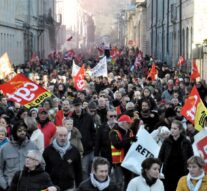
Should Europe be worried about protests in France?
Employment and Social Affairs 11 April 2023Estimated time of reading: ~ 2 minutes
Nationwide protests against Emmanuel Macron’s pension reforms have been a constant feature in the last few months in France. Thousands of people gathered in the streets of every French city to show their anger, while unions tried -and succeeded- to paralyze the national economy. Many observers outside France found it difficult to understand the reasons behind such expressions of rage in the streets and the violent tone of many protesters, in a way that resembles the Yellow Jacket marches in 2018 and 2019.
France is one of the main countries in the EU and the coverage of protests all over the nation has instilled some doubts over the country’s stability, especially after the government led by Prime Minister Elisabeth Bornesurvived a no-confidence vote with only a nine-vote margin, late in March. As of this date, there have been eleven mobilizations by protesters in France, leading even King Charles III to postpone a historic visit to the country. Macron tried to reassure people inside and outside France that the situation is under control while confirming that he is not going to change his mind about the reform package. French opposition leaders, such as Luc Melenchon and Marine Le Pen, can take advantage of Macron’s difficulties.
Should the EU look with some worries at what is happening and brace for the possible spread of the protests in other countries? After two huge crises, such as the Covid pandemic and the one originating from the economic effects of the war in Ukraine, the situation in Europe looks quite calm, but there are no assurances that things will remain the same. Soaring inflation, led by energy and food prices, could be the reason for new protests in the countries which pay the highest price to this dynamic, especially if the general trend in Europe should go in the other way. In the rest of 2023, important elections are on the agenda in Greece, Slovakia, Poland, and Spain, where people can express their discomfort in the ballots instead of the streets.
Written by: Francesco Marino


